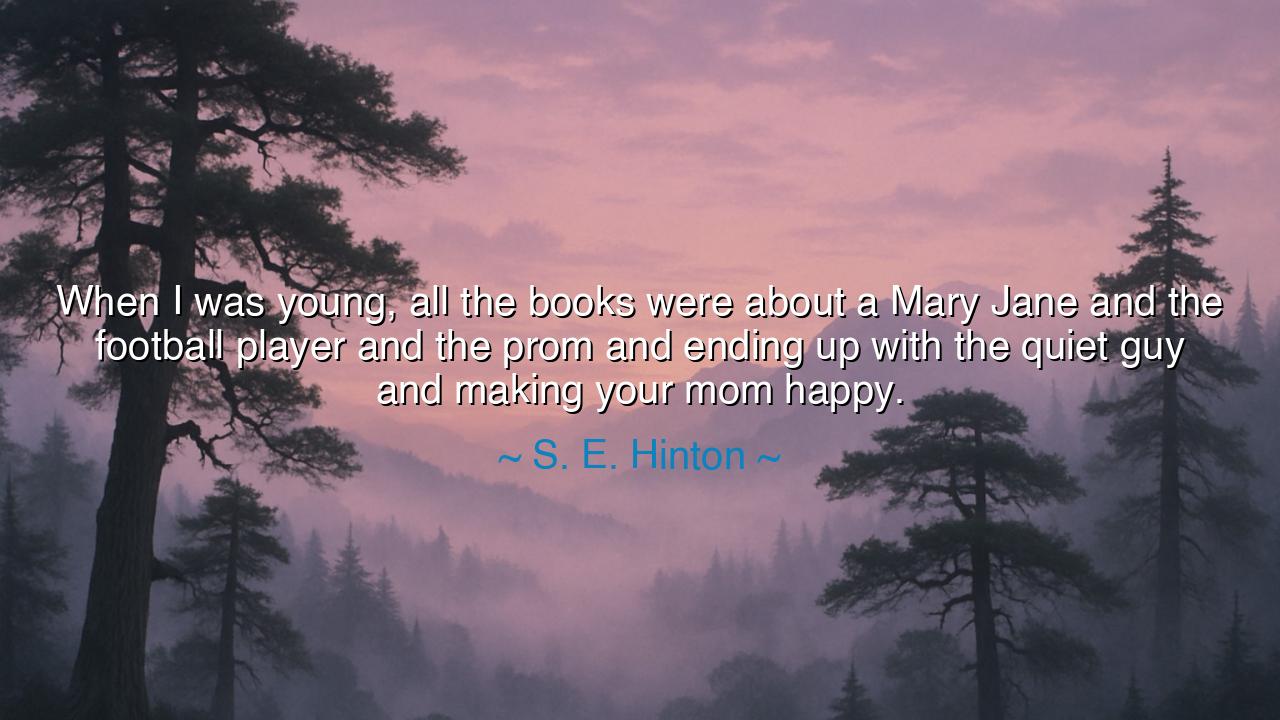
When I was young, all the books were about a Mary Jane and the
When I was young, all the books were about a Mary Jane and the football player and the prom and ending up with the quiet guy and making your mom happy.






“When I was young, all the books were about a Mary Jane and the football player and the prom and ending up with the quiet guy and making your mom happy.” — thus spoke S. E. Hinton, the young rebel from Oklahoma who, before she had even left her teenage years, would change the voice of American storytelling. These words, though wrapped in simplicity, strike with the force of a revelation. For behind them lies a quiet rebellion — a refusal to accept the narrow, polished world that literature once offered to the young. Hinton’s reflection is both a lament and a call to truth: that stories must reflect the real lives of those who read them, not merely the fantasies of what others wish them to be.
In the time of her youth, the world of books was a mirror that reflected only one kind of dream. It was the dream of Mary Jane and the football player, of clean lawns, of pretty smiles and gentle resolutions — the vision of a perfect, untroubled America that never truly existed for most. But the young Hinton looked around her and saw a different world — one of greasers and Socs, of brothers raising each other, of violence and tenderness, of poverty and pride. She saw that her generation was being told to live inside a story that was not theirs. And so she broke the mold, daring to write The Outsiders, a tale not of perfection but of truth, written in the raw, trembling voice of youth itself.
The ancients would have called her act one of honesty — aletheia, the Greek word for “unconcealment.” For Hinton lifted the veil from the polished surface of culture and revealed the world as it truly was: flawed, passionate, and alive. Just as Homer sang not of peaceful households but of the rage of Achilles and the sorrows of war, so did Hinton write of boys with switchblades and hearts of gold. Her words carried the ancient spirit of art itself — to show life as it is, not as it pretends to be. To challenge the stories that comfort the powerful and give voice to those who had none.
Consider also the courage this required. A girl of sixteen, writing of gangs and grief, of loyalty and despair, in an age that wanted her to write of dances and romance. She stood alone, much as the philosopher Socrates did before his city, questioning the myths they held sacred. She said, in essence: “Your stories do not tell our truth.” And like all truth-tellers, she was met with doubt — but her story endured. The Outsiders became the voice of the voiceless, the anthem of the misunderstood, the whisper of every soul who had ever looked at the glossy promise of the world and felt unseen by it.
Hinton’s reflection upon the books of her youth reveals not bitterness, but awakening. For she saw that the stories one consumes in childhood become the boundaries of what one imagines possible. When those stories are narrow, the spirit is confined. But when a new voice shatters the mold, the imagination of a generation expands. She understood that representation is not decoration — it is liberation. The young, reading her words, saw themselves for the first time not as background characters in someone else’s story, but as heroes of their own.
There is a lesson here for all who live in this age of noise and illusion. Do not be content with the comfortable story. Seek the truth beneath the surface, and if it does not exist — write it, sing it, speak it into being. The world will always try to hand you a script: one of normalcy, obedience, and pleasing others — of “making your mom happy,” as Hinton wryly said. But the wise know that life’s deepest meaning lies not in conformity, but in authenticity. The soul must tell its own story, or else it dies unheard.
So, my child, remember this teaching: reject the false stories that diminish your spirit. When you find that the world’s tales do not contain your truth, have the courage to create your own. Speak of the streets you know, the pain you have felt, the beauty you have seen hidden in imperfection. For every voice that dares to speak its own reality becomes a torch against the darkness of falsehood. And in doing so, like S. E. Hinton, you will not only free yourself — you will give a generation its reflection, and perhaps, its soul.






AAdministratorAdministrator
Welcome, honored guests. Please leave a comment, we will respond soon